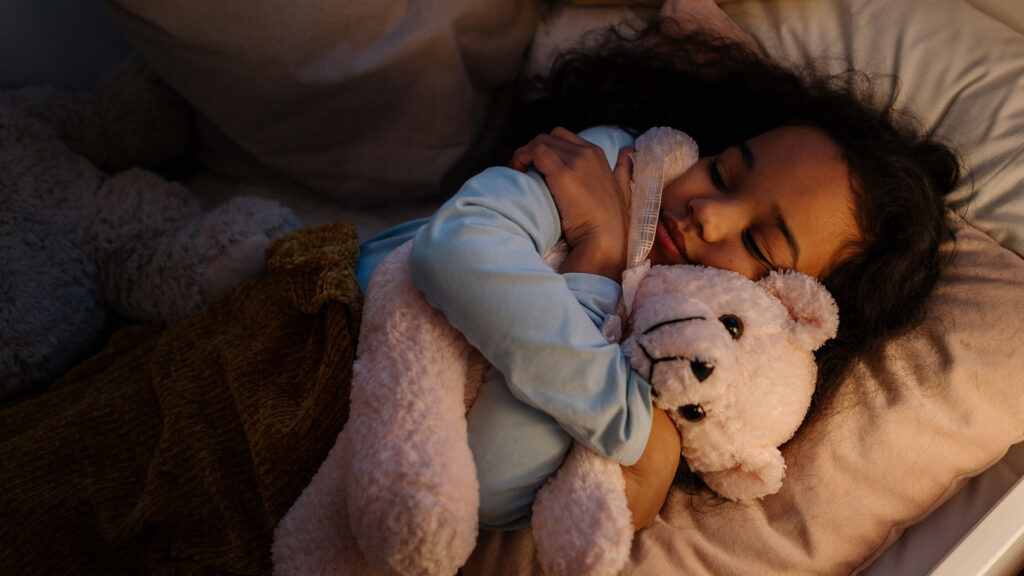
Chronic lack of sleep affects all areas of daily life, from mood to productivity and even the quality of relationships. For children who are growing and developing, with brains taking in vast amounts of new information for processing and applying to their lives, insufficient sleep can be devastating. Recently, researchers have found that children who consistently lack sleep from infancy may have a higher risk of developing psychosis in early adulthood. (1)
“Sleep is crucial for brain development and emotional regulation — without enough sleep, kids might struggle with controlling their emotions and stress, which can lead to mental health problems,” explains Dr. Chelsea Perry, owner of Sleep Solutions in Westborough, MA. She adds that poor sleep can affect how well kids’ brains function, making it harder to think clearly and remember things. “Over time, these issues can contribute to the development of psychosis,” she says.
While the development of psychosis is complex and has several factors, sleep plays a major role in how the brain processes and deals with emotions. Without quality sleep, especially over a long period, mental health is at a high risk for deterioration. For kids, this can have lifelong consequences.
The Study’s Findings
A study conducted by the University of Birmingham found that children who consistently slept fewer hours between the ages of 6 months and 7 years were more likely to develop psychotic disorders. The research also explored the link between sleep deprivation and immune system health to determine if there is any connection between the two and the likelihood of developing psychosis. (1)
Researchers collected data from the Avon Longitudinal Study of Parents and Children, monitoring sleep patterns from six months to seven years and mental health at 24 years. Children who consistently slept fewer hours during this time were over twice as likely to develop a psychotic disorder in early adulthood and nearly four times as likely to have a psychotic episode.
The researchers checked the immune system health of participants by measuring inflammation levels in blood samples when they were nine years old. They discovered that a weakened immune system might be partly responsible for the connection between long-term sleep deprivation and the onset of psychosis in early adulthood.
Previous research has found links between sleep problems and psychosis at specific times, but this study is the first to demonstrate the long-term impact of persistent lack of sleep. However, the researchers noted that while ongoing lack of sleep is a significant predictor of psychosis, there are likely other important factors involved as well.
Chronic Sleep Loss Impacts the Brain and Emotions
“Lack of sleep in childhood and adolescence may be the biggest contributing factor to our youth mental health crisis,” says Ellen B. Braaten, PhD Associate Professor, Harvard Medical School, Kessler Family Chair in Pediatric Neuropsychological Assessment, and Executive Director of Learning and Emotional Assessment Program (LEAP).
According to the American Psychological Association, inadequate sleep profoundly impacts the brain, especially the part regulating thoughts, emotions, and behaviors. Consequently, the brain’s fight-or-flight response becomes more intense, which means negative emotional reactions ramp up while emotional control is lacking.
Earlier research on adults shows people with psychosis often experience sleep disturbances from the early stages of the disease, even before diagnosis. Targeting sleep early on can potentially stop the development of mental disorders in their tracks before psychosis occurs.
“Continuous sleep issues can disrupt brain development and emotional health, and long-term sleep deprivation can lead to difficulties, raising the likelihood of mental health problems like psychosis,” explains Dr. Perry. Previous research shows that a lack of REM sleep, particularly, is linked to stronger negative emotional reactions.
REM sleep is essential for the brain circuits that control reward, emotion, and cognitive control. When disrupted, the processing and storage of emotional experiences are blunted, leading to more negative emotions and anxiety. In short, losing sleep, especially REM sleep can result in more anxious thoughts and feelings. Over time, as a child develops negative opinions and views of the world, it can contribute to poor mental health.
“Even after just a couple of nights, sleep deprivation predisposes us to a negative emotional bias,” says Dr. Braaten. Chronic sleep deprivation can lead to chronic feelings of perceiving life as being worse than it really is and impacts cognitive skills, which are essential for learning, she explains. “When we’re tired, it’s more difficult to stop unwanted thoughts from entering our minds.”
More Research is Necessary
It’s important to note that while the study is interesting, it’s correlational, so it needs to be put into perspective, according to Dr. Braaten. The study might be evidence that sleep problems are an early indicator of psychosis in adulthood rather than sleep causing the psychosis. “This may be due to the fact that sleep problems are associated with other disorders, such as anxiety and ADHD, both of which are associated with increased levels of psychosis—though the actual increase is small,” she says.
However, Dr. Braaten agrees that sleep problems are associated with many aspects of psychological and biological functioning and that treatment for sleep disorders in children is critical. “This study adds to the list of associations—healthy sleep habits are crucial to the developing brain,” she says.
Importance of Early Interventions
The study shows how important it is to help children sleep better to reduce the risk of mental health problems. Early intervention and good sleep habits can make a big difference.
When you don’t get enough sleep, your immune system can become overactive, causing inflammation in the brain. “This inflammation can affect how your brain works, potentially leading to symptoms of psychosis like hallucinations and delusions,” says Dr. Perry.
Early intervention and good sleep habits can help reduce the risk of psychosis in young adults by ensuring their brains develop properly and manage stress better, Dr. Perry says. She recommends teaching kids good sleep routines, like having a regular bedtime and no screens two hours before bedtime, to create a foundation for healthy sleep. “This helps prevent sleep problems from becoming long-term issues that could lead to mental health problems like psychosis,” she says. Addressing sleep issues early can keep children’s brains and emotional health in good shape.

How to Sleep Better With Arthritis

New Study Shows Surprising Link Between Coffee, Exercise, and Sleep

Could a Foot Massage Before Bed Significantly Improve Your Sleep?

How To Sleep With Lower Back Pain
Sources
1. University of Birmingham; “Children sleep problems associated with psychosis in young adults,” Science Daily; https://www.sciencedaily.com/releases/2024/05/240508113129.htm; May 8, 2024.
Perry, Chelsea. Author interview. May 2024.
Braaten, Ellen B. Author interview. May 2024.